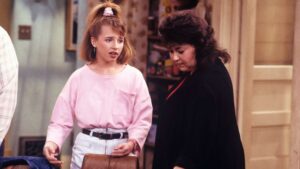
One of comedy’s great icons – and certainly the female comic icon for a generation – is trampling on her own history, and it’s ugly. New York magazine has published an article by Roseanne Barr entitled “And I Should Know” in which she writes about the trials of being a female star on US television. It’s had many of my feminist friends on their feet, applauding – but I think Barr is doing a worse demolition job on feminism, not to mention her self-titled show, than any of those culprits she singles out in the article.
Roseanne ran for nine seasons and was one of my favourite sitcoms growing up. It focused on a working-class mum from Illinois (Roseanne) and her wise-cracking family, and I loved the gobby female characters and unflinching put-downs. Along with Moonlighting, it was one of the first shows in which we saw a loving relationship thriving almost entirely on comic banter and mock contempt.

Roseanne and Dan (John Goodman) were this wonderfully flawed, childish couple, clearly still nuts about each other and coping amiably with all the crap life threw at them. Daughter Darlene was my teenage heroine. The show did such good things for comedy; it is rightly held up as an inspiration by many comedy writers today.
But in her New York magazine article, Barr describes how, having signed up with production company Carsey-Werner, she was horrified to discover at the first episode’s premiere party that she wasn’t credited as “creator”. Instead that credit went to a male screenwriter who’d been brought in to develop the show with her. It seemed as though she had sold her idea to the ABC network and was then unable to understand that it no longer belonged solely to her.

Barr’s article then proceeds, for over 3,500 words, to rip into any member of the production who dared to disagree with her, dubbing them bullies and misogynists who stole her work. She seems to think this justifies her behaviour, which included threatening a female producer with scissors and the words, “Bitch, do you want me to cut you?” and refusing to move “for hours” during shooting when she objected to a line in the script.
She complains that the head writer didn’t “care about the show” and that his eventual replacement was also not a “team player”. Who knows the truth behind either of these opinions? But it certainly sounds as though anyone who disagreed with Barr was instantly added to her shit-list.

Whatever meddling went on – and it happens to everyone in television, not just women – the end product was a show I will always love. But I read most of the article through my fingers. Barr was given a perfect platform to talk about the obvious inequality in the industry and the frustrating “decision by committee” way television is produced (not just in the US). But instead she shouts down anyone who disagrees with her and calls them a woman-hater. She seems proud of her former bratty behaviour rather than embarrassed by it. Flying the working class, feminist flag with one hand, while kvetching about not being to get a table at her favourite celebrity restaurant with the other.

In Barr’s case, it’s not simply about her being silenced because she’s a woman. If your method of communicating is shouting, sulking and threats of violence, of course you won’t get what you want. Or worse, you will, along with a reputation as a capricious tyrant.
At the end of the article – where, by the way, she reassures us she’s not bitter – I wasn’t left feeling like a righteous blow had been struck for the sisterhood. More that a once-feted star was vandalising the memory of a brilliant show because she’s unable to let go of her anger at not getting her own way.
